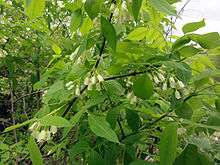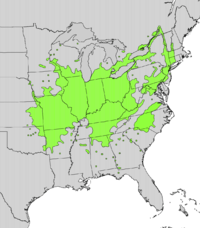Staphylea trifolia
| Staphylea trifolia | |
|---|---|
 | |
| Scientific classification | |
| Kingdom: | Plantae |
| (unranked): | Angiosperms |
| (unranked): | Eudicots |
| (unranked): | Rosids |
| Order: | Crossosomatales |
| Family: | Staphyleaceae |
| Genus: | Staphylea |
| Species: | S. trifolia |
| Binomial name | |
| Staphylea trifolia L. | |
Staphylea trifolia, the American bladdernut,[1] is native to eastern North America, from southern Ontario and southwestern Quebec west to Nebraska and Arkansas, and south to Florida.
It is a medium-sized shrub growing to 11 m (36 ft) tall. Its growth rate is medium to fast. The leaves are opposite and divided into three leaflets, each leaflet up to 10 cm (4 in) long and 5 cm (2 in) broad, with a serrated margin. The leaves are bright green in the spring, turning dark green in the summer. S. trifolia produces pendant white flowers in spring, which mature into bladder-like, teardrop-shaped fruits that contain several large black seeds.

Natural range
References
- ↑ "Staphylea trifolia". Natural Resources Conservation Service PLANTS Database. USDA. Retrieved 1 December 2015.
- Germplasm Resources Information Network: Staphylea trifolia
- Missouriplants: Staphylea trifolia photos
| Wikimedia Commons has media related to Staphylea trifolia. |
This article is issued from Wikipedia - version of the 8/24/2016. The text is available under the Creative Commons Attribution/Share Alike but additional terms may apply for the media files.